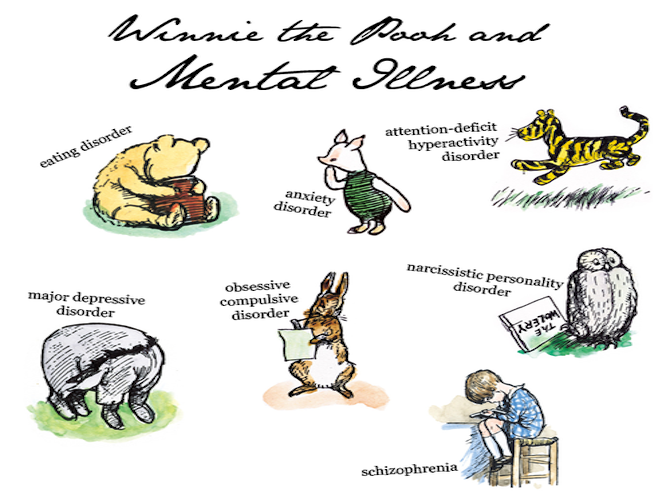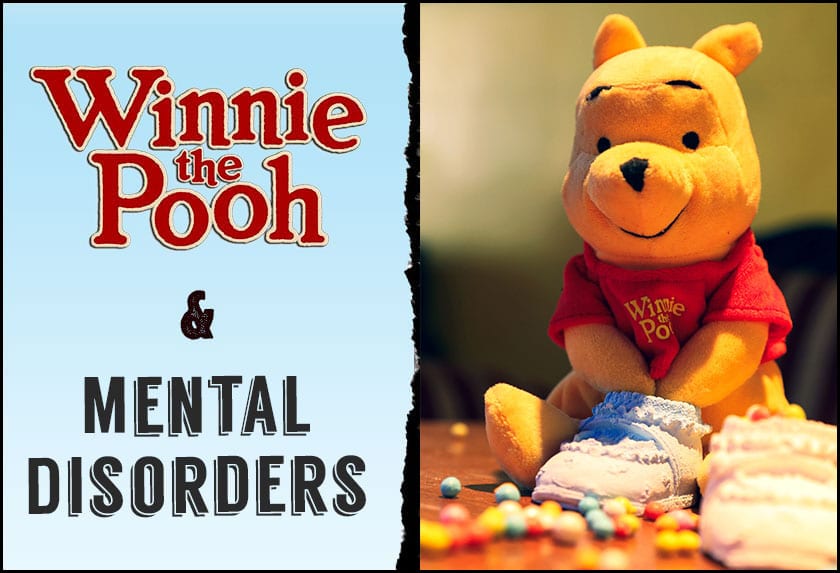Winnie The Pooh & Mental Health: A Surprising Look!
Could the whimsical world of the Hundred Acre Wood hold a mirror to the complexities of the human mind? It might seem an unlikely pairing, but a closer look at Winnie the Pooh and his friends reveals a fascinating, and surprisingly insightful, exploration of mental health.
The enduring charm of A.A. Milne's stories lies not just in their delightful characters and heartwarming adventures, but also in their subtle portrayal of the human condition. Each resident of the Hundred Acre Wood, from the ever-optimistic Pooh to the perpetually gloomy Eeyore, possesses unique traits and behaviors that resonate with readers of all ages. While Milne may not have explicitly intended his stories as allegories for mental illness, the characters' actions and reactions often mirror the experiences of individuals struggling with various psychological challenges. This unexpected connection offers a valuable opportunity to understand and discuss mental health issues in a more accessible and relatable way.
Let's explore the psychological profiles of some of the most beloved characters in the Hundred Acre Wood, delving into the potential mental health challenges they represent, and the lessons we can learn from their experiences.
Before we proceed further, it's essential to state that this exploration is not a clinical diagnosis. We are examining the characters through the lens of potential mental health parallels, based on observed behaviors and patterns within the context of the stories. This is intended as a thought-provoking exercise, not a definitive medical analysis.
Winnie-the-Pooh, the affable bear with a penchant for honey, might be seen to embody several aspects of mental health challenges. His relentless pursuit of honey is a primary driver in his life, often leading him to ignore other responsibilities or even basic safety. His focus is unwavering and can be viewed as a symbol of obsession. The constant craving, the strategic planning for honey acquisition, and the subsequent distress when honey is unavailable, all these factors point towards compulsive behaviors.
Furthermore, Pooh's forgetfulness, inattentiveness, and tendency to get sidetracked suggest potential indicators of attention-deficit/hyperactivity disorder (ADHD). He often drifts off in thought, struggles to focus on tasks, and frequently forgets things, such as where he is going or what he was planning to do. Pooh's world is often characterized by disordered thoughts, random comments, and a general disorganization, a cluster of traits that are often associated with ADHD.
Piglet, the small, timid pig, is another character whose portrayal can be understood within the context of mental health. His anxiousness and fearfulness are often quite prominent. He displays a constant state of worry, easily scared by the simplest of things, and seeks reassurance from his friends. Piglets anxiety might be linked to the emotional trauma that he has experienced. His responses and constant caution can reflect an anxiety disorder.
Eeyore, the perpetually pessimistic donkey, portrays characteristics of depression. Eeyores constant sadness, low energy, and sense of hopelessness are classic signs. He frequently expresses feelings of worthlessness and believes that things will always go wrong, which reflects the core symptoms of major depressive disorder. His outlook, marked by detachment and a lack of enthusiasm, is often consistent with a negative outlook on life.
Tigger, the bouncy, energetic tiger, showcases some characteristics of impulsivity and a possible hyperactive nature. Tigger is always on the move, unable to sit still, and constantly seeks out new adventures. His impulsiveness can lead to him to act without thinking of the consequences, and he often fails to consider the impact of his actions on others. The fact that he loves to bounce around and is energetic might suggest a possible hyperactivity issue.
Rabbit, the organized and efficient character, has a tendency toward rigidity and control. His focus on order and his strong need for things to be "just so" could possibly represent aspects of obsessive-compulsive disorder (OCD). Rabbit's concern about routine and his discomfort with the unpredictable can sometimes be seen.
Owl, the self-proclaimed wise one, often embodies the characteristics of a narcissist. Owl's tendency to believe that his own opinions are the only right ones, his frequent condescension towards other characters, and his habit of lecturing rather than listening reflect a certain level of self-importance and an overinflated ego. He also loves to talk, often without considering the perspective of others. His self-proclaimed wisdom might also be a defense mechanism.
The stories of Winnie the Pooh and his friends can be a gentle starting point for mental health conversations. The Hundred Acre Wood provides a relatable environment to think about mental health. Its a reminder of the value of compassion, understanding, and friendship when you are dealing with mental health issues. When you understand the characters of Winnie the Pooh and their mental health you can see that its alright to be who you are.
These characters, and their struggles, may help open the doors for conversations about the need for empathy and compassion towards people who face similar issues. The tales remind us of the importance of kindness, friendship, and providing support to those in need.
The exploration of Winnie the Pooh characters and their potential mental health parallels is not meant to be a medical diagnosis. This exercise allows us to gain insight into the multifaceted nature of mental health and offer a more accessible way to engage in discussions about the subject. These parallels serve as a reminder of the importance of empathy, compassion, and support in navigating the ups and downs of mental well-being.
These tales are not just stories for children; they offer a framework to have a discussion. Sharing the challenges of the Hundred Acre Wood characters can help people connect on mental health issues.
| Character | Possible Mental Health Correlation | Behaviors & Traits | Lessons & Insights |
|---|---|---|---|
| Winnie the Pooh | Obsessive-Compulsive Disorder (OCD) / ADHD |
|
|
| Piglet | Anxiety Disorder |
|
|
| Eeyore | Depression |
|
|
| Tigger | Impulsivity / ADHD |
|
|
| Rabbit | Obsessive-Compulsive Disorder (OCD) |
|
|
| Owl | Narcissistic Personality Traits |
|
|
These stories, from the perspective of characters, highlight the need for support. Understanding and compassion are shown in the Hundred Acre Wood, which is important when addressing mental health issues.
By exploring the characters and their potential mental health conditions, we get to learn about human behaviors. Even a childrens story can provide a pathway to mental health discussions.
Winnie the Pooh and his friends live in a world where theres understanding, and kindness. Through these characters, we get to experience the importance of companionship and support when we are going through emotional and psychological challenges. Whether it's Pooh's obsession with honey or Piglet's worry, the stories remind us that everyone faces challenges, and having the right support makes a huge difference.
The Hundred Acre Wood provides a backdrop to begin conversations about mental health, a world that has characters who are not perfect, and these characters remind us that it is okay to struggle, that it is okay to need help, and that through friendship and compassion, we can learn to navigate the complexities of life, together.


